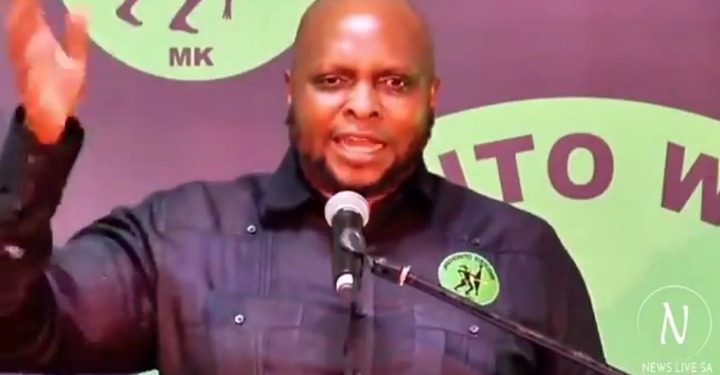In a significant move aimed at safeguarding the integrity of its leadership, the uMkhonto weSizwe (MK) Party has decided to do away with elective conferences, citing growing concerns about political infiltration. MK Party Deputy Leader Floyd Shivambu announced the decision during a press briefing, stating that the leadership is focused on ensuring the party remains independent and free from external interference.
The MK Party, which was founded by former President Jacob Zuma after breaking away from the African National Congress (ANC), has faced persistent concerns about potential infiltration from rivals and other external forces. The party leadership now believes that traditional elective conferences have become vulnerable to manipulation, prompting this proactive step.
Speaking at the briefing, Shivambu highlighted the risks that elective conferences pose to the stability and unity of the party. “We have observed that many political organizations are infiltrated during the electoral processes, leading to divisions and instability. To avoid falling into this trap, we have taken the bold decision to move away from elective conferences Shivambu said.
Elective conferences, which are typically seen as a cornerstone of political party democracy, allow party members to choose their leadership. However, they have also been criticized for creating openings for internal conflict, with external actors often seeking to sway the outcomes in their favor. According to Shivambu, this shift will help preserve the authenticity of the MK Party mission.
Shivambu emphasized that the MK Party is more focused on unity and collective leadership rather than power struggles that often emerge during elections. “We are prioritizing the integrity of the movement and protecting it from those who seek to use it as a vehicle for their own personal agendas. By moving away from elective conferences, we are ensuring that the party remains focused on its goals he added.
The party new approach will involve a system of internal consultations and consensus-building among senior leaders. Shivambu assured that this process would still be inclusive and transparent, but with a greater emphasis on avoiding the pitfalls that come with elections.
The MK Party will still involve its members in decision-making, but leadership appointments will now be based on extensive consultations with trusted and loyal members. This way, we prevent external forces from undermining the party’s leadership,” Shivambu explained. He added that the party’s internal processes would remain democratic but without the vulnerabilities associated with large-scale elective gatherings.
Critics however have raised concerns that this shift could lead to a lack of democratic participation among rank-and-file members. Political analyst Professor Ralph Mathekga cautioned that while the MK Party’s intention to protect itself from infiltration is valid, the absence of elective conferences could alienate party members who value the right to choose their leaders. Elective conferences are not just about leadership selection; they also provide a platform for ordinary members to have their voices heard. Moving away from this tradition might create discontent if members feel sidelined Mathekga said.
Despite these concerns many in the MK Party believe that the move will strengthen the organization in the long run. Shivambu noted that the decision to abandon elective conferences was not made lightly and that it was in response to both internal and external threats to the party stability.
This is about protecting the legacy of the MK Party and ensuring that it remains a force for good in South African politics. We have seen what happens when other political organizations allow themselves to be infiltrated there is chaos, corruption, and the abandonment of core principles. We will not allow that to happen here Shivambu concluded.
As the MK Party continues to grow its influence, especially in the run-up to future elections, the decision to eliminate elective conferences is seen as a strategic move to maintain its independence and avoid internal conflicts. Whether this shift will impact the party’s unity or participation from the broader membership remains to be seen, but Shivambu’s confidence in the new direction signals that the leadership is resolute in protecting the party from infiltration and destabilization.






















